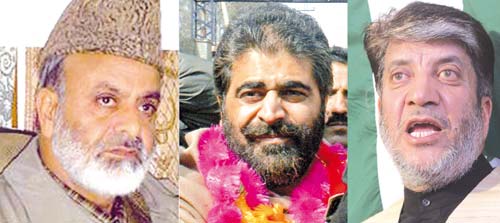Peoples League is one of the few parties that claim to be the front runners in Kashmir’s resistance. The emergence of a new faction last week suggests of an apparent weak foundations and a class struggle within, reports Shah Abbas.

In the last week of May, Jammu Kashmir Peoples League (JKPL), the oldest separatist groups in Kashmir valley, suffered another split. The latest faction to emerge out of JKPL is the Mukhtar Waza faction who was called back by the central council of Hurriyat Conference (M) some days back. Waza, an executive member of Hurriyat (M), was acting chairman of JKPL.
The formation of JKPL, a premier separatist political organization by a group of young Kashmiris on October 1, 1974, was the outcome of the fall of Dacca in 1971, the Shimla Agreement and the subsequent parleys between Sheikh Mohammed Abdullah and Indira Gandhi that eventually led to the 1975 Accord.
Since its formation, JKPL has been headed by more than a dozen chairmen and it broke into a number of factions. At one point of time, there were as many as thirteen factions in JKPL. Many among the present frontline separatist leaders and senior activists have a background of JKPL, directly or indirectly. All these leaders are now heading their own parties. Shabir Ahmad Shah, Nayeem Ahmad Khan, Fazal Haq Qureshi and Mohammad Farooq Rehmani are some of the faces which are the products of JKPL but are presently heading their own parties.
Khan was a student of Class 11 when he joined JKPL. He later went on to form his own party, Jammu and Kashmir National Front, in 1997. “I was a student of Class 11 in 1978 when I joined JKPL,” Khan said. Interestingly, among Kashmir’s separatist leadership, all these leaders talk of unity in a very high tone all the time.
When JKPL was formed, it was a time of political confusion and crisis, and Kashmir was at crossroads. Pakistan was divided into two during the Indo-Pak war of 1971 which ultimately led to Shimla pact in 1972. The pact did not mention Kashmir as a tripartite issue between India, Pakistan and Kashmiris, and by November 1974, Late Sheikh Abdullah was ready to enter into an agreement with Indira Gandhi.
The Delhi-Srinagar parleys turned Kashmir into a State-Center issue. To counter this changing political scenario, the young separatist faces like Shabir Ahmad Shah, Fazal Haq Qureshi, Abdul Majid Pathan and Nazir Ahmad Wani decided to form a separatist political platform.
“I was in jail in early 1974. Fazal Haq Qureshi, Abdul Majid Pathan and Nazir Ahmad Wani were also going through detention. Though all of them belonged to different pro-freedom parties, yet we felt the importance of a strong and joint political party. It was there in the jail that we formed People’s League,” said Shabir Ahmad Shah.
Another senior separatist leader Azam Inquillabi told Kashmir Life that JKPL was formed by Fazal Haq Qureshi, Abdul Majid Pathan and Nazir Ahmad Wani. “I still remember it. At a room of Awqaf building at Maisuma, the name for the party was unanimously finalized. I was not a part of the JKPL but I was there just as a friend,” recalls Inquillabi.
The records available suggests that the decision to work under single banner was taken by Shah, Qureshi and others in the jail but it was formally finalized in the meeting which Inquillabi refers to. “But alas, the same PL which was formed to unite the people met a fate of factionalism. I still remember when Late Sheikh Abdul Aziz as the chairman of JKPL counted on fingers and put the number of PL factions to thirteen,” Inquillabi said.
The factionalism in the oldest separatist party hurts Azam Inquillabi but he does not know the reasons behind it or he perhaps he is reluctant to share his views. But Sheikh Zahoor, an active member of JKPL from 1975, is vocal about it. “The sole responsibility lies on the frontline leadership of JKPL,” he said.
“The first chairman of the party was Fazal Haq Qureshi who was followed by Nazir Ahmad Wani, Late Abdul Razaq Sopori and Mohammad Farooq Rehmani till 1989,” Zahoor told Kashmir Life. Rehmani and Wani are out of their homeland since a long while as Sopori died of a disease allegedly caused by interrogations done by forces.
It was at this point of time that the party was hit by factionalism. “Rehmani and S Hameed separated and two groups were known after their names. Shabir Ahmad Shah was General Secretary, JKPL, at that time and he opted to be a part of S Hameed group,” Zahoor said.















